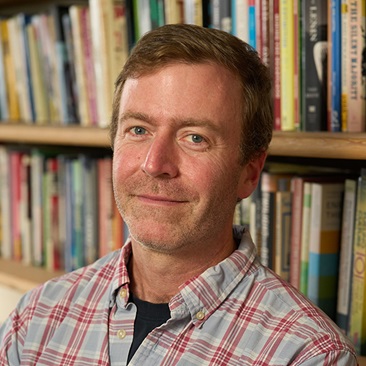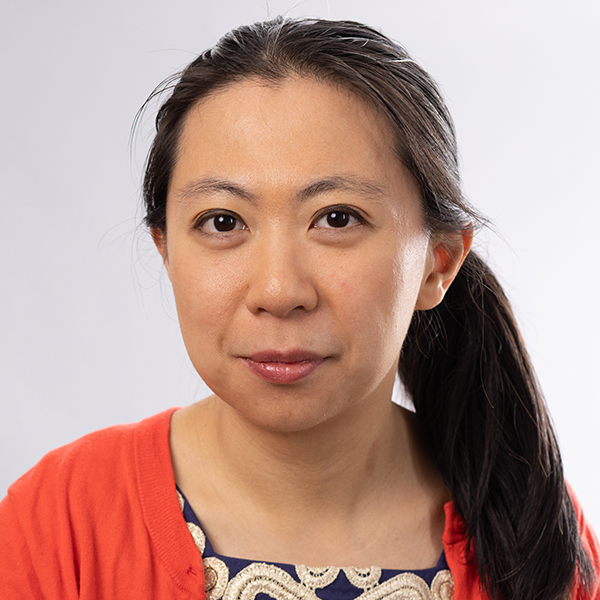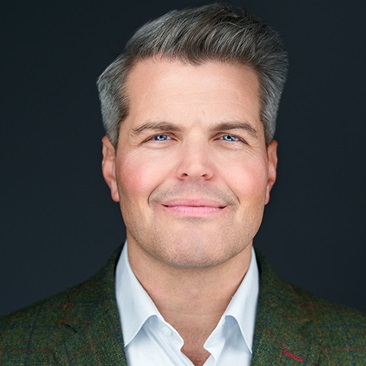full-time faculty teaching and conducting research in political science
of Maxwell faculty conduct research focused outside of the U.S.
graduate students in residence; fewer than 12 admitted each year
Undergraduate Studies
Graduate Studies

I am Maxwell.
Civic engagement is a core value for me. I have always aspired to help the communities I’m from.” Mazaher Kaila, a Maxwell alumna and third-year student at Syracuse University's College of Law, moved with her family from Sudan to Central New York when she was four years old. “I realized that to make meaningful change in society, I needed to understand the systems that power it—government and politics—and that’s insight I would gain by studying political science.”
Mazaher Kaila ’19, L’22
political science, law

New Carnegie-Maxwell Policy Planning Lab Launches Foreign Affairs Training Program
February 1, 2024
International relations professionals may apply for the first-of-its-kind program supported by the Carnegie Corporation of New York.
A new lab housed in the Maxwell School of Citizenship and Public Affairs seeks to bridge the gap between scholarship and policy in foreign affairs by providing training for professionals working in a range of related careers.
The recently launched Carnegie-Maxwell Policy Planning Lab brings together emerging national security leaders, subject matter experts and seasoned policy professionals to provide a six-month program for aspiring foreign affairs leaders.
Program participants will attend two weekend-long, in-person workshops where they will analyze contemporary regional and functional issues, identify challenges and formulate policy. In addition to the workshops, the program includes an online seminar focused on developing management and leadership skills organizers say are critical as foreign policy experts progress in their careers.
Each cohort can accommodate up to 20 participants; there are no associated costs, as the lab is supported by a grant from the Carnegie Corporation of New York, a grantmaking foundation established in 1911 by Andrew Carnegie to support the “advancement and diffusion of knowledge and understanding.”
The $400,000 Carnegie award is provided through its Bridging the Gap initiative, which seeks to connect policy and academic communities to positively impact foreign policy decision-making.
Michael John Williams, associate professor of public administration and international affairs and director of the master of arts in international relations program, was awarded the funding on behalf of Maxwell and serves as the lab’s founding director. The lab will be situated in the Daniel Patrick Moynihan Institute of Global Affairs.
“We’re grateful to the Carnegie Corporation for its support and recognition of the critical role this lab and training will provide those working in the field of foreign affairs,” says Williams. “This is a wonderful opportunity to connect busy policymakers who are inundated with challenges with scholars who have time to study issues in-depth and mull through opportunities for the future. Bringing them together in this format will allow younger policymakers not only to think differently about the challenges they face, but also to form lifelong relationships with scholars working on issues germane to their interests.”
Williams says a quote by former U.S. Secretary of State Dean Acheson underscores the lab’s objective. In the early years of the Cold War, Acheson said the purpose of policy planning is to “anticipate the emerging form of things to come, to reappraise policies which had acquired their own momentum and went on after the reasons for them had ceased, and to stimulate and, when necessary, to devise basic policies crucial to the conduct of our foreign affairs.”
The Policy Planning Lab’s training program will be especially beneficial for those who have roughly five-to-seven years’ experience working in government, such as State Department employees and policy advisors in Congress, says Williams. Those interested in participating may apply or can be nominated by a colleague, supervisor or other professional affiliate.
“It addresses a critical need, providing an opportunity for younger policymakers to step outside the day-to-day and think deeply about global challenges, and an opportunity for scholars to gain insights and perspective from program participants who are on the frontlines of these issues.”
Brian Taylor
Director, Moynihan Institute of Global Affairs
Each cohort will focus on a timely international topic. The first program’s theme is “Postwar: Europe, Ukraine and the Future of European Order.” It begins with an in-person workshop at Syracuse University April 19-21; the second in-person session will be held at the University’s Minnowbrook Lodge in the Adirondacks from Aug. 17-20.
Williams brings expertise to the topic; he recently returned from a four-month research trip to Brussels, Belgium, funded by a Fulbright-North Atlantic Treaty Organization (NATO) Security Studies Award. Based at the Centre for Security, Diplomacy and Strategy at the Brussels School of Governance, he examined NATO, Russia and the enduring war in Ukraine.
Policy Planning Lab participants will likewise benefit from Williams’ Moynihan Institute colleagues, who bring a range of perspectives and focus areas. Tetiana Hranchak, for instance, is a visiting assistant teaching professor who fled her home in Ukraine following the Russian invasion because she was at risk due to her research on the politics of memory. Brian Taylor, professor of political science and director of the Moynihan Institute, authored “The Code of Putinism” (Oxford University Press, 2018), which shows how the mentality of Russian President Valdimir Putin has shaped the country’s politics over the past two decades.
“The Policy Planning Lab aligns with Moynihan’s mission to support scholarship, training and practice in global affairs,” says Taylor. “It addresses a critical need, providing an opportunity for younger policymakers to step outside the day-to-day and think deeply about global challenges, and an opportunity for scholars to gain insights and perspective from program participants who are on the frontlines of these issues.”
The Carnegie funding supports the lab for the next two years. Williams says additional support is possible to ensure its longevity. “We are open to additional sponsorship by organizations that believe in the necessity of connecting the knowledge of scholars with policy formulation,” he says. “No matter where you look in the world today, from the current conflict in the Middle East, to the rise of China in Asia and the surge of organized crime across Latin America, there are any number of problems where policymakers could well utilize in-depth academic knowledge.”
Other initiatives funded by Carnegie’s Bridging the Gap program include the Henry A. Kissinger Center for Global Affairs at Johns Hopkins University and the Teaching, Research & International Policy lab at the College of William and Mary. The original Bridging the Gap program began at American University (AU) under the leadership of James Goldgeier and Bruce Jentleson; Williams is an alumnus of the AU program.
Additionally, Bridging the Gap sponsors a book series, for which there is another Maxwell School faculty connection: Catherine Herrold’s “Delta Democracy: Pathways to Incremental Civic Revolution in Egypt and Beyond” (Oxford University Press, 2020) is among its supported works and was awarded the Virginia A. Hodgkinson Research Book Prize in November 2021.
By Jessica Youngman
Published in the Spring 2024 issue of the Maxwell Perspective
More information, including instructions for perspective applicants, is available on the Carnegie-Maxwell Policy Planning Lab website. Applications for the first cohort are due by Feb. 23.
Related News
Commentary

Aug 1, 2024
Commentary

Jul 31, 2024
Commentary

Jul 31, 2024
Commentary

Jul 30, 2024
BaoBao Zhang Joins First Cohort of AI2050 Early Career Fellows
One of only 15 scholars chosen from across the U.S., Zhang will receive up to $200,000 in research funding over the next two years. Zhang will use the funding to partner with the nonprofit, non-partisan Center for New Democratic Processes to test whether public participation in AI governance is increased through the creation of public assemblies, known as “deliberative democracy workshops.”
Baobao Zhang
Assistant Professor, Political Science Department


New Carnegie-Maxwell Policy Planning Lab Launches Foreign Affairs Training Program
February 1, 2024
International relations professionals may apply for the first-of-its-kind program supported by the Carnegie Corporation of New York.
A new lab housed in the Maxwell School of Citizenship and Public Affairs seeks to bridge the gap between scholarship and policy in foreign affairs by providing training for professionals working in a range of related careers.
The recently launched Carnegie-Maxwell Policy Planning Lab brings together emerging national security leaders, subject matter experts and seasoned policy professionals to provide a six-month program for aspiring foreign affairs leaders.
Program participants will attend two weekend-long, in-person workshops where they will analyze contemporary regional and functional issues, identify challenges and formulate policy. In addition to the workshops, the program includes an online seminar focused on developing management and leadership skills organizers say are critical as foreign policy experts progress in their careers.
Each cohort can accommodate up to 20 participants; there are no associated costs, as the lab is supported by a grant from the Carnegie Corporation of New York, a grantmaking foundation established in 1911 by Andrew Carnegie to support the “advancement and diffusion of knowledge and understanding.”
The $400,000 Carnegie award is provided through its Bridging the Gap initiative, which seeks to connect policy and academic communities to positively impact foreign policy decision-making.
Michael John Williams, associate professor of public administration and international affairs and director of the master of arts in international relations program, was awarded the funding on behalf of Maxwell and serves as the lab’s founding director. The lab will be situated in the Daniel Patrick Moynihan Institute of Global Affairs.
“We’re grateful to the Carnegie Corporation for its support and recognition of the critical role this lab and training will provide those working in the field of foreign affairs,” says Williams. “This is a wonderful opportunity to connect busy policymakers who are inundated with challenges with scholars who have time to study issues in-depth and mull through opportunities for the future. Bringing them together in this format will allow younger policymakers not only to think differently about the challenges they face, but also to form lifelong relationships with scholars working on issues germane to their interests.”
Williams says a quote by former U.S. Secretary of State Dean Acheson underscores the lab’s objective. In the early years of the Cold War, Acheson said the purpose of policy planning is to “anticipate the emerging form of things to come, to reappraise policies which had acquired their own momentum and went on after the reasons for them had ceased, and to stimulate and, when necessary, to devise basic policies crucial to the conduct of our foreign affairs.”
The Policy Planning Lab’s training program will be especially beneficial for those who have roughly five-to-seven years’ experience working in government, such as State Department employees and policy advisors in Congress, says Williams. Those interested in participating may apply or can be nominated by a colleague, supervisor or other professional affiliate.
“It addresses a critical need, providing an opportunity for younger policymakers to step outside the day-to-day and think deeply about global challenges, and an opportunity for scholars to gain insights and perspective from program participants who are on the frontlines of these issues.”
Brian Taylor
Director, Moynihan Institute of Global Affairs
Each cohort will focus on a timely international topic. The first program’s theme is “Postwar: Europe, Ukraine and the Future of European Order.” It begins with an in-person workshop at Syracuse University April 19-21; the second in-person session will be held at the University’s Minnowbrook Lodge in the Adirondacks from Aug. 17-20.
Williams brings expertise to the topic; he recently returned from a four-month research trip to Brussels, Belgium, funded by a Fulbright-North Atlantic Treaty Organization (NATO) Security Studies Award. Based at the Centre for Security, Diplomacy and Strategy at the Brussels School of Governance, he examined NATO, Russia and the enduring war in Ukraine.
Policy Planning Lab participants will likewise benefit from Williams’ Moynihan Institute colleagues, who bring a range of perspectives and focus areas. Tetiana Hranchak, for instance, is a visiting assistant teaching professor who fled her home in Ukraine following the Russian invasion because she was at risk due to her research on the politics of memory. Brian Taylor, professor of political science and director of the Moynihan Institute, authored “The Code of Putinism” (Oxford University Press, 2018), which shows how the mentality of Russian President Valdimir Putin has shaped the country’s politics over the past two decades.
“The Policy Planning Lab aligns with Moynihan’s mission to support scholarship, training and practice in global affairs,” says Taylor. “It addresses a critical need, providing an opportunity for younger policymakers to step outside the day-to-day and think deeply about global challenges, and an opportunity for scholars to gain insights and perspective from program participants who are on the frontlines of these issues.”
The Carnegie funding supports the lab for the next two years. Williams says additional support is possible to ensure its longevity. “We are open to additional sponsorship by organizations that believe in the necessity of connecting the knowledge of scholars with policy formulation,” he says. “No matter where you look in the world today, from the current conflict in the Middle East, to the rise of China in Asia and the surge of organized crime across Latin America, there are any number of problems where policymakers could well utilize in-depth academic knowledge.”
Other initiatives funded by Carnegie’s Bridging the Gap program include the Henry A. Kissinger Center for Global Affairs at Johns Hopkins University and the Teaching, Research & International Policy lab at the College of William and Mary. The original Bridging the Gap program began at American University (AU) under the leadership of James Goldgeier and Bruce Jentleson; Williams is an alumnus of the AU program.
Additionally, Bridging the Gap sponsors a book series, for which there is another Maxwell School faculty connection: Catherine Herrold’s “Delta Democracy: Pathways to Incremental Civic Revolution in Egypt and Beyond” (Oxford University Press, 2020) is among its supported works and was awarded the Virginia A. Hodgkinson Research Book Prize in November 2021.
By Jessica Youngman
Published in the Spring 2024 issue of the Maxwell Perspective
More information, including instructions for perspective applicants, is available on the Carnegie-Maxwell Policy Planning Lab website. Applications for the first cohort are due by Feb. 23.
Related News
Commentary

Aug 1, 2024
Commentary

Jul 31, 2024
Commentary

Jul 31, 2024
Commentary

Jul 30, 2024

